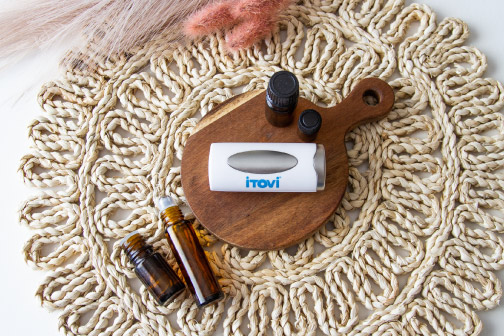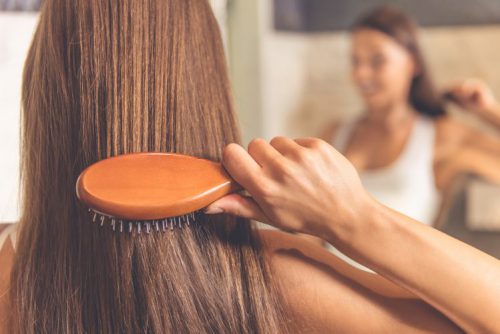
Be it minty, bubblegum-flavored, or homemade—there is nothing that beats the “clean mouth” feeling your get from mouthwash!
Many popular mouthwash brands, including Listerine, use essential oils or essential oil constituents to help fight gingivitis, tooth decay, and bad breath.
But what are the rules for essential oil use in mouthwash? Where can mouthwash, with or without essential oils, go wrong? What safe DIY recipes are there?
And what else can we do to make sure our oral wellness is tip top?
A Little Background on Your Mouth
On a typical day, your mouth is home to millions of bacteria.
It sounds gross, we know. But rest assured, most of these bacteria are good for you. They help produce essential salivary enzymes, keep gum disease at bay, and can even help prevent heart disease and depression!
Of course, only some of the bacteria in your mouth are the good guys. Other bacteria, especially the kind that like to feast on sugar, damage your teeth, gums, and overall oral health over time.
The idea is to keep the nasty bacteria at bay while still allowing the good bacteria to thrive.
Rule #1: Mouthwash Can’t Replace Thorough Brushing & Flossing
The main targets of bad bacteria are often your gums and the enamel on your teeth. So, if there’s any place we’re willing to kill some good bacteria to get to the bad ones—it’s there.
Brush your teeth for at least two minutes twice a day. And floss thoroughly every day.
Rule #2: Only Use Mouthwash Once a Day
Mouthwash is powerful. And the point of it is that it gets everywhere inside your mouth.
A nice 1-minute, swish-and-gargle with mouthwash can help you keep bad bacteria at bay. But overusing your mouthwash can kill lots of the good bacteria as well and lead to serious health problems. It can dry up your gums, give rise to mouth sores, and more!
One study even found that using mouthwash twice or more a day correlated to a 55% increased risk of developing diabetes or having unhealthy blood sugar spikes!
So don’t overdo it with your mouthwash!
If you experience any of the following symptoms, you might want to cut down on your mouthwash use even more:
- Teeth staining
- Symptoms of dry mouth
- Any gum bleeding that happens when you use your mouthwash
- Pain or sensitivity while brushing after using mouthwash
- Persistent and/or inflamed canker sores
Rule #3: If you use essential oils in your oral care, be sure to dilute them properly.
The top three methods for applying essential oils in your oral care are:
-Adding a drop or two of oil to your toothpaste/toothbrush. This should be done carefully. Start with just a small amount to test for an allergic reaction, using it once or twice a week, and then build up from there.
-Making your own mouthwash with essential oils. We don’t recommend mixing your oils with a pre-made mouthwash as it’s possible that the ingredients might interfere with each other. (Most recipes recommend using only 2-20 drops of oil per overall cup of mouthwash solution. That’s a 0.5% dilution rate.)
-Oil pulling with essential oils. This is done by mixing one or more of the best oral-care oils (see list below) into 1-2% dilution with a carrier oil, usually coconut oil (although you can also use sesame, sunflower, or olive oil). Swish this solution around in your mouth for 5-15 minutes and then spit it out. Learn more about oil pulling here.
What are the BEST essential oils to use in oral care?
Peppermint
Popular in breath-freshening gums, toothpaste, and commercial mouthwashes, peppermint does far more than add flavor!
Peppermint can help fight the bad anaerobic bacteria that hides between your teeth, can help reduce cavities, and even help reduce pain and inflammation!
And, menthol, one of peppermint oil’s primary constituents, has been a part of the Listerine recipe for more than100 years!
Clove
Clove is famous for its oral health benefits. In fact, eugenol, a primary chemical constituent in clove oil, is used widely in dentist’s offices to make tooth fillings and treat toothaches. Clove has great natural antibacterial properties that can help you keep your mouth healthy!
Myrrh
Myrrh is especially known in Ayurvedic medicine as a medicine for oral health. It also may be able to help with the healing of intra-oral mucosal wounds, but should not be used for extended periods at a time until more research is done.
Thyme
Thyme’s disinfectant and antiinflammatory properties are well-known, which is why thyme and its major constituent, thymol, are often used in mouthwashes. And the flavor can be quite refreshing as well!
Oregano
Oregano boasts powerful antimicrobial properties that can help fight off oral pathogens, as well as impressive antioxidant benefits and even fungicide properties. Just be sure to dilute it because oregano can pack a punch!
Cinnamon
Fighting oral pathogens, relieving pain, balancing blood sugar, and with a fantastic warm and spicy scent, cinnamon oil is a great oil of choice for your oral health needs! Again, just be sure to dilute and you’re on your way!
Ingredients for a Simple, But Effective EO Mouthwash
Most homemade mouthwash recipes call for mixing your oils in a >1% dilution rate with distilled (or filtered) water in a sturdy glass bottle.
Some keep it as simple as that, but other possible additions to your solution include a small amount of:
- Salt
- Baking Soda
- Xylitol (for sweetening)
- Mineral drops
- Aloe vera juice
Be Diligent
It can be very easy to see thorough, daily oral care and a tedious chore. But, given how much your oral health can affect your overall health, appearance, and quality of life, a solid, daily, oral care routine is worth it!
| Class Ideas |
|




